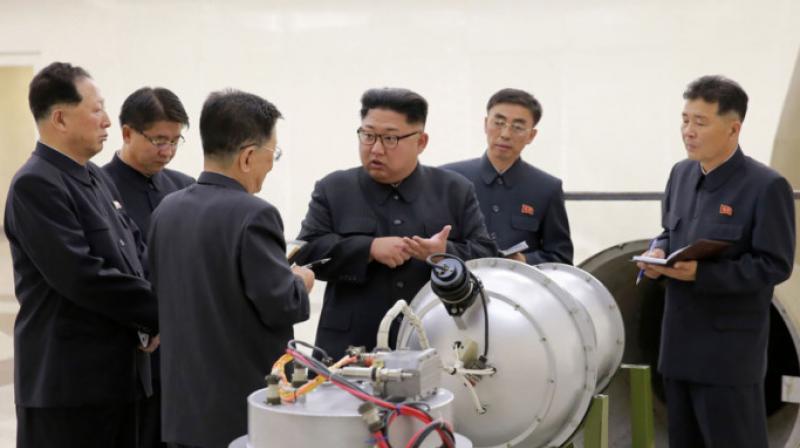North Korea defiant over UN sanctions as Trump says tougher steps needed
The UN resolution was triggered by North Korea's sixth and largest nuclear test this month, which it said was of an advanced hydrogen bomb.

Seoul/Washington: North Korea remained defiant over new UN sanctions imposed for its latest nuclear test, vowing on Wednesday to redouble efforts to fight off what it said was the threat of a US invasion.
US President Donald Trump said Monday’s sanctions, unanimously agreed on Monday by the 15-member UN Security Council, were just a small step towards what is ultimately needed to rein in Pyongyang over its weapons programmes.
The North’s Foreign Ministry said the resolutions were an infringement on its legitimate right to self defence and aimed at “completely suffocating its state and people through full-scale economic blockade”.
“The DPRK will redouble the efforts to increase its strength to safeguard the country’s sovereignty and right to existence and to preserve peace and security of the region by establishing the practical equilibrium with the US,” it said in a statement carried by the official KCNA news agency.
DPRK stands for the Democratic People’s Republic of Korea, North Korea’s official name.
The statement echoed comments on Tuesday by the North’s ambassador to the United Nations in Geneva, Han Tae Song, who said Pyongyang was “ready to use a form of ultimate means”.
“The forthcoming measures ... will make the US suffer the greatest pain it ever experienced in its history,” Han said.
The North’s Rodong Sinmun also accused South Korea of being Washington’s “puppet” on Wednesday, criticising Seoul’s agreement with the United States to amend an existing bilateral guideline that will now allow the South to use unlimited warhead payloads on its missiles.
The UN Security Council agreed to boost sanctions on North Korea, banning its textile exports and capping fuel supplies, and making it illegal for foreign firms to form commercial joint ventures with North Korean entities.
The UN resolution was triggered by North Korea’s sixth and largest nuclear test this month, which it said was of an advanced hydrogen bomb.
South Korea’s Nuclear Safety and Security Commission said on Tuesday traces of xenon-133 isotope found in South Korean territory were linked to the test, although it said it could not be determined whether a hydrogen bomb had been tested.
Damage to mountainous terrain at the North’s nuclear test site in Punggye-ri seen in satellite imagery taken after the latest test was more extensive than anything seen after the five previous tests, the Washington-based 38 North project said.
There was also activity at another location in the Mount Mantap site involving large vehicles and mining equipment that suggests “onsite work could now be changing focus to further prepare those other portals for future underground nuclear testing,” said 38 North, which monitors North Korea.
North Korea has also tested a missile capable of reaching the United States, but experts said it is likely to be at least a year before it can field an operational nuclear missile that could threaten the US mainland.
ANOTHER SMALL STEP
Trump has vowed not to allow that to happen.
A tougher initial US draft was weakened to win the support of China and Russia, both of which hold UN veto power. Significantly, it stopped short of imposing a full embargo on oil exports to North Korea, most of which come from China.
“We think it’s just another very small step, not a big deal,” Trump told reporters at the start of a meeting with Malaysian Prime Minister Najib Razak.
“I don’t know if it has any impact, but certainly it was nice to get a 15-to-nothing vote, but those sanctions are nothing compared to what ultimately will have to happen.”
US Treasury Secretary Steven Mnuchin warned China, North Korea’s main ally and trading partner, that Washington would “put additional sanctions on them and prevent them from accessing the US and international dollar system” if it did not follow through on the new measures.
Another senior administration official told Reuters any such “secondary sanctions” on Chinese banks and other companies were on hold for now to give China time to show it was prepared to fully enforce the latest and previous rounds of sanctions.
Washington so far has mostly held off on new sanctions against Chinese banks and other companies doing business with North Korea, given fears of retaliation by Beijing and possibly far-reaching effects on the world economy.
Russia and China both say they respect UN sanctions and have called on the United States to return to negotiations with North Korea. They have also said they could kick-start talks with North Korea if the United States halts joint military drills with South Korea, which Washington has rejected.
An article carried on the front page of the People’s Daily, the official paper of China’s ruling Communist Party, said the Korean peninsula had reached the “moment of choice” where the United States and North Korea must break from the cycle of nuclear tests and sanctions.
“All parties involved in the peninsula have their own strategic considerations, but not being able to see beyond this vicious cycle is not in anyone’s interest,” the article said.
In another show of force, South Korea’s Air Force conducted its first live-fire exercise of Taurus long-range, air-to-surface missiles on Tuesday, the defence ministry said, as practice for precision bombing North Korean facilities.
US Ambassador to the United Nations Nikki Haley said the new sanctions could eventually starve North Korea of an additional $500 million or more in annual revenue.
The United States has said that a previous round of sanctions agreed in August was aimed at cutting North Korea’s $3 billion in exports by a third.

